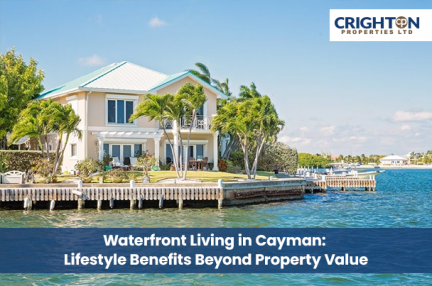
How to Style Waterfront Homes: Décor Tips for Ocean Views
Discover décor tips to style your Cayman waterfront home. Enhance ocean views with coastal colors, natural textures, and smart furniture placement.
Crighton Properties | September 26, 2024
Are you thinking about moving to the beautiful Cayman Islands? With its stunning beaches, clear waters, and lively atmosphere, it's no surprise that many people dream of living in this Caribbean paradise. Before you relocate here, it's important to be fully prepared for the Cayman lifestyle.
In this guide, we'll provide key tips for relocating to the Cayman Islands, focusing on expenses and practical advice to help make your move as smooth as possible.
Work Permit: If you're planning to move to the Cayman Islands for work, securing an employer-sponsored work permit is essential. This permit should be processed and approved before you arrive.
Residency: For those seeking long-term residency, options include pathways through employment, investment, or other criteria. Permanent residency is available to individuals who meet specific requirements.
Visitor Visa: Depending on your nationality, you can also get a Visa on arrival. It's important to research the visa requirements for your country of origin well in advance to avoid any delays or issues during the relocation process. Understanding these immigration steps ensures a smooth transition.
Accommodation is usually one of the major expenses when relocating, so it's crucial to set your budget and choose a property that fits your lifestyle before you start looking for it. Whether you're looking for a rental or Cayman Islands homes for sale, explore options like beachfront homes, condos, and family houses to understand the Cayman Islands property market.
Explore different neighborhoods to find the one that suits you best. Areas such as Seven Mile Beach, George Town, and West Bay are popular options for rental properties.
If you're interested in buying a property, Cayman allows foreigners. However, you may want legal advice for transactions, so consult with a Cayman real estate company. They know the market and can help with legal steps, property laws, and negotiations. Their guidance makes your property search easier and more successful.
But ensure your rental or buying property is connected to CUC (electricity), FLOW or Digicel (internet/phone), and Water Authority Cayman (water).
When relocating to a new nation, it is critical to understand your financial obligations. In addition to purchasing a house, you must budget for additional expenses such as stamp duty, legal fees, and property insurance. Consider your choices if you're getting a mortgage from a local bank.
Remember that the cost of living in the Cayman Islands can be higher than in the USA and Europe. While there is no direct tax, daily expenses such as groceries, utilities, healthcare, and transportation differ. Make a budget for these expenses and arrange other activities accordingly.
Healthcare in the Cayman Islands is excellent, especially in Grand Cayman, which has modern facilities to meet medical needs. The doctors and medical staff are well-trained and experienced in handling various health issues. While most medications are available, some may need to be imported. It's a good idea to plan if you rely on specific medicines.
However, basic health insurance is mandatory for all Cayman residents. So, ensure you're covered as soon as you are willing to relocate here.
When moving to the Cayman Islands, kids' education expenses are an important consideration, if any. The islands offer a range of public (Available for Cayman citizens or permanent residents), private, and international school options.
Schools in the Cayman Islands are known for their high-quality education, so that you can choose according to your budget, location, and other factors. Most expats prefer private schools, while locals often enroll in public schools.
When moving to the Cayman Islands, setting up a local bank account is essential for salary deposits and daily expenses. Popular banking options include RBC, Butterfield Bank, First Caribbean International Bank, and Cayman National Bank. One of the significant financial benefits of living in the Cayman Islands is the absence of direct taxes. There is no income, capital gains, or property tax.
However, it's important to consider additional costs, as import duties and fees on goods and services can increase your overall living expenses. Planning your relocation with these factors will help you manage your budget effectively.
Usually, people who shifted their business here to Cayman or permanently relocated buy their vehicle, as public transport options are limited. You can drive with a valid international driver's license or convert your home country license to one from the Department of Vehicle & Driver's Licensing.
Car rental options are also available for short-term needs; Andy's Car Rental, Budget Car Rental, and others offer convenient options across the islands.
The Cayman Islands is a multicultural society with a large expat community. Public events, social clubs, and sports leagues help expats settle in Cayman and adopt local culture.
In addition to its culture, Cayman is known for its unique weather compared to other Western countries. It's sunny year-round, with a risk of hurricanes during the summer and fall months. Stay prepared for storm season and buy home insurance for unexpected home repairs caused by a hurricane.
Moving your belongings to the Cayman Islands takes careful planning. You must decide whether to ship your furniture and personal items or buy new ones locally. If you choose to ship, consider using an international moving company specializing in Caribbean relocations.
Remember that there are import duties and rules for bringing personal items into the Cayman Islands. Make sure to declare everything correctly and follow customs guidelines to avoid any issues when you arrive.
Many companies offer relocation services to help expats move, including shipping, settling, and finding housing. However, look for local options to ease the process.
If you're relocating to the Cayman Islands, you can make the transition smoother by considering visas, housing, living costs, healthcare, and education.
With careful planning and research, relocation to this Caribbean island may be a pleasant and fascinating experience. Whether you're coming for a job, a change of pace, or retirement, the Cayman Islands have lots to offer for a successful new beginning.
Move during the dry season from November to April for cooler, less humid weather. This avoids hurricane season (June to November). Note that it's also peak tourist time, so services might be busier.
Yes, you can bring pets. You'll need an import permit, rabies vaccination, microchipping, and a rabies titer test. Some dog breeds might be restricted.
Yes, some companies specialize in moving to the Cayman Islands, like NCI Freight & Logistics, Navigate Cayman Islands, and IRC. They offer moving and relocation services.

Discover décor tips to style your Cayman waterfront home. Enhance ocean views with coastal colors, natural textures, and smart furniture placement.

Learn how Cayman Islands’ continuous infrastructure improvements are driving better living standards, efficient travel, and stronger communities.

Explore the lifestyle perks of living on the water in Cayman, from breathtaking sunsets to easy beach access, wellness, and superior quality of life.